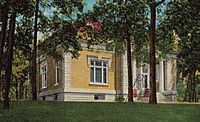Elgin Public Museum facts for kids

Elgin Public Museum before the east wing was added in 1998
|
|
| Established | 1907 |
|---|---|
| Location | 225 Grand Boulevard Elgin, Illinois |
| Type | Natural history, anthropology |
The Elgin Public Museum is a cool place to learn about nature and people. It's a natural history museum found in Elgin, Illinois. This museum is over 100 years old! You can find it inside the big 108-acre Lords Park.
What the Museum Does
Learning About Nature and Cultures
The museum's main goal is to help you learn more about science and different cultures. They do this through fun exhibits and hands-on activities.
Their purpose is to help people understand and appreciate our natural world. They also want us to learn about cultures from the past and present. The museum helps us see how choices made by people long ago affect us today.
Museum History
Building a Special Place for Learning
The Elgin Public Museum building was first built in 1907. It was called the Lord Memorial Museum. It opened its doors in 1920 as the Elgin Audubon Museum. This makes it the oldest museum building in Illinois still used as a museum!
The museum's first collection of items was a gift from Mr. and Mrs. G. P. Lord. These items were first shown in the Lords Park Pavilion in 1898. The Lords wanted their collection to have its own special building. So, a local architect named David E. Postle was hired in 1904 to design it.
Growing the Museum Building
The original plan for the museum had three sections, called wings. But only the west wing and the main hall were finished at first. They ran out of money before they could build the third part.
In 1998, the east wing was finally added. This made the building look like its original neo-classical design. The new part matched the old building perfectly. It used the same brick and special limestone details. Inside, the museum has beautiful original oak wood, fancy plaster walls, and ceramic tile floors.
New Features for Everyone
In July 2000, the museum reopened with exciting new features. They added a new entrance on the north side that is easy for everyone to use. There was also a new elevator and public restrooms.
New exhibits were also opened. These included "Exploring the Waterways: The LaSalle Expedition" and "Nature of Elgin." They also added a fun, hands-on Children's Discovery Room. The museum's gift shop was made bigger too!
Museum Exhibits
Exploring Nature and History
Today, the museum has many interesting exhibits. You can learn about Mazon Creek fossils, which are ancient plant and animal remains. There are also displays about Native American ways of life. You can see models of huge mammals from the Ice Age.
Other exhibits teach you about the Fox River ecosystem. You can also learn about the La Salle Expeditions. There are sections on endangered species, rocks, and minerals. You'll see many stuffed animals and natural history items. These show wildlife that lives in the Fox River Valley.
Fun for Kids: The Discovery Room
The museum also has a special Discovery Room. This is an interactive playroom just for kids! It has games and puzzles. There's also a hands-on collection where you can touch furs, turtle shells, and other cool nature objects.
Outside the museum, in the 108-acre Lords Park, you can see more animals. There's a farm zoo, and you can even see bison and elk!
Past Special Exhibits
One past exhibit was "A Shadow Over the Earth: The Life and Death of the Passenger Pigeon." This exhibit talked about the passenger pigeon. It explained how this bird became extinct 100 years ago. The exhibit even had a real passenger pigeon specimen! This special exhibit was created by the University of Michigan Museum of Natural History.
Education Programs
Learning for All Ages
The museum offers many classes for both adults and children. They also have special programs for schools and scouting groups. You can learn about different subjects like:
- anthropology (the study of human cultures)
- ecology (how living things interact with their environment)
- geology (the study of Earth's rocks and land)
- paleontology (the study of fossils and ancient life)
- zoology (the study of animals)
They also host fun seasonal events throughout the year.
 | Selma Burke |
 | Pauline Powell Burns |
 | Frederick J. Brown |
 | Robert Blackburn |

